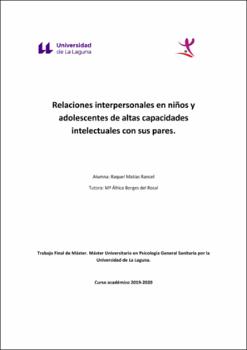Relaciones interpersonales en niños y adolescentes de altas capacidades intelectuales con sus pares.
Author
Matias Rancel, RaquelDate
2021Abstract
El alumnado de altas capacidades intelectuales constituye un colectivo altamente
heterogéneo, por lo que no existe un consenso sobre rasgos que lo defina, pero sí un
conjunto de atributos cognitivos comunes. En el plano socioafectivo no ocurre lo
mismo: las investigaciones en relación al plano socioafectivo del colectivo de altas
capacidades dan como resultado dos posturas enfrentadas. Por un lado se defiende
que las personas con altas capacidades presentan dificultades para relacionarse con
sus pares; por otro lado, las que sostienen que este colectivo representa una ventaja a
nivel social y emocional, por lo que pueden ser más efectivas en las demandas de la
sociedad. En este estudio se analizarán las relaciones y estrategias de interacción de
los alumnos de altas capacidades con sus pares dentro del entorno escolar para darnos
cuenta de que no presentan dificultades que apoyan algunos estudios. High abilities students are a highly heterogeneous group, consequently there is not a
consensus about their attributes, however there are commons cognitive attributes.
Does not happen the same in the socio-affective plane: the investigations about the
socio-affective plane of the high abilities collective result in two opposing positions. On
the one hand it is argued that people with high abilities have difficulties in relating to
their peers; on the other hand, those who argue that this group represents an
advantage at a social and emotional level, so they can be more effective in the
demands of society. This study will analyze the relationships and interaction skills of
high abilities students with their peers within the school environment to realize that
they do not present difficulties.




